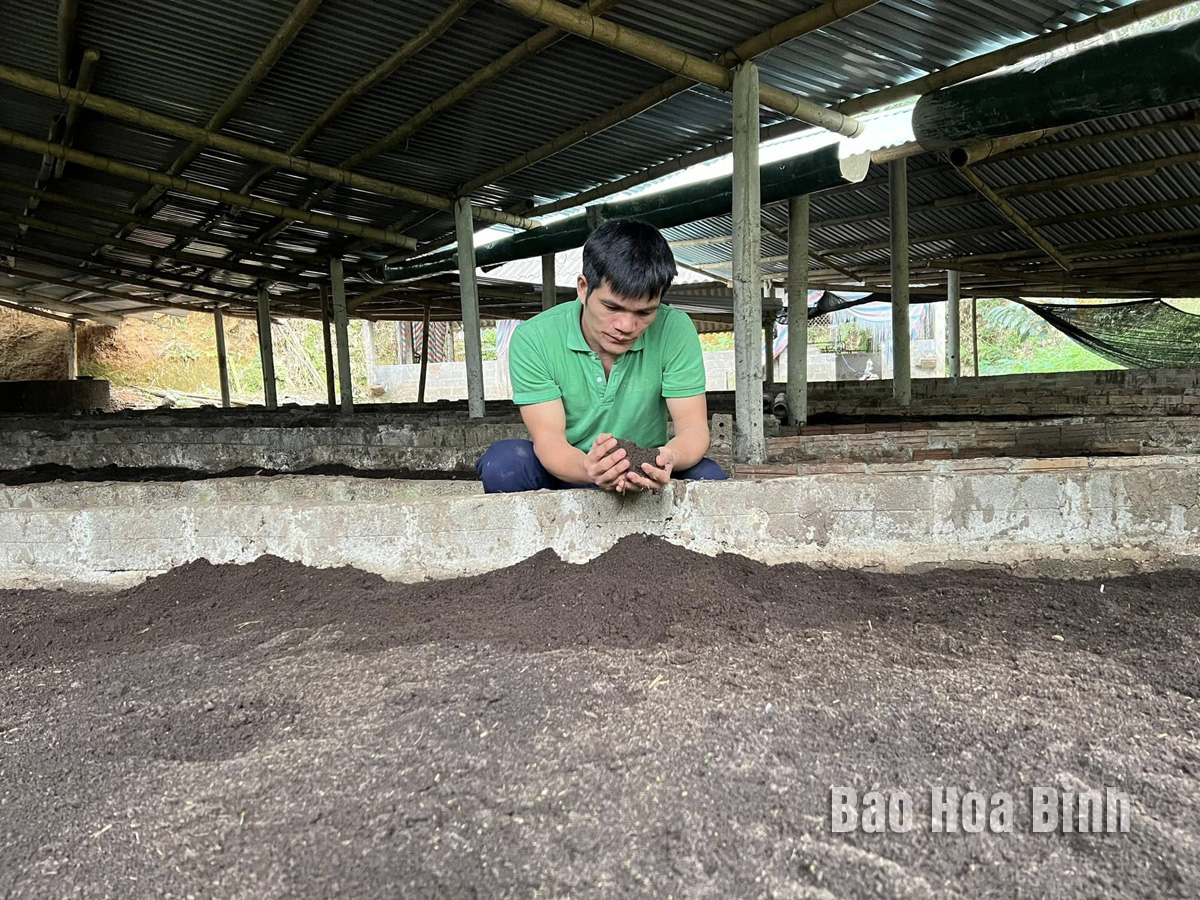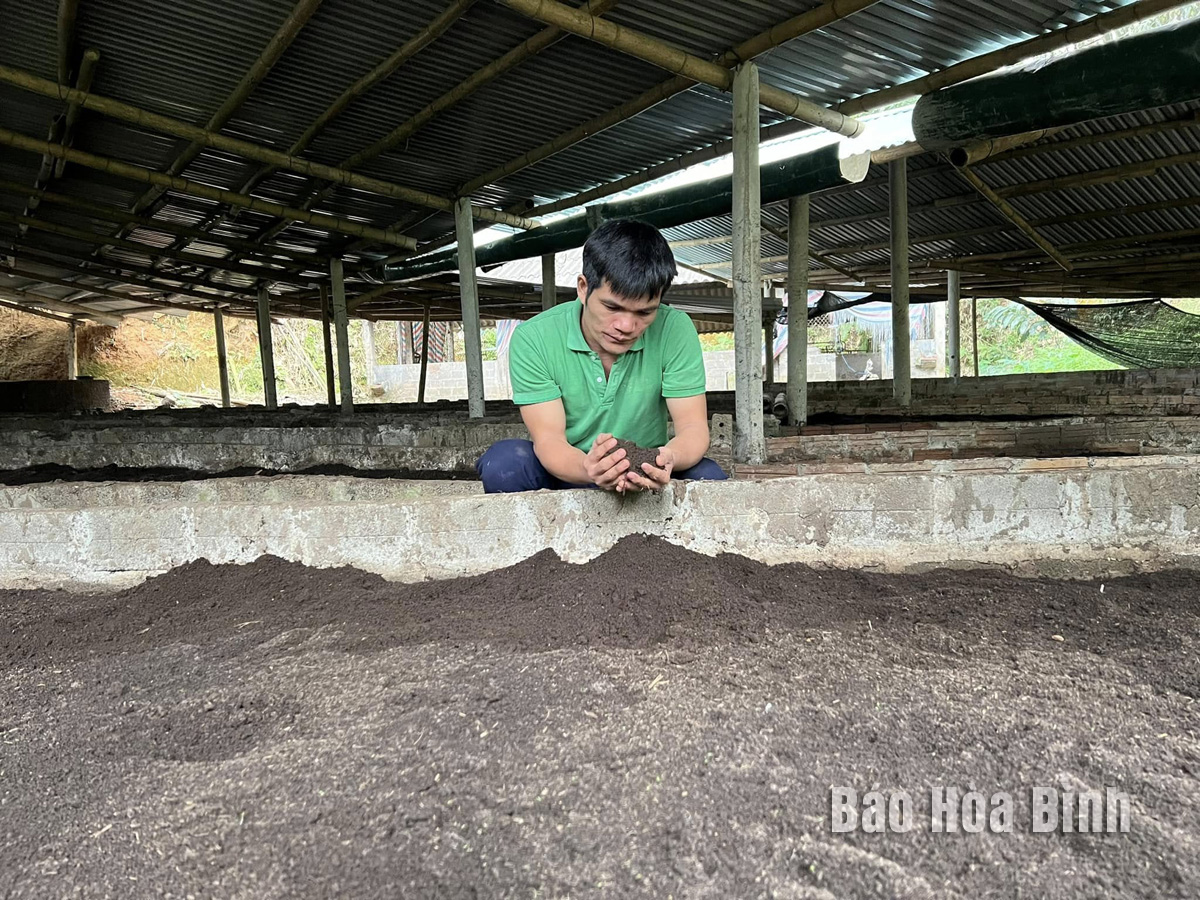
In recent years, the economic development model "Hoa Binh Earthworm Farm” run by Mr. Bui Van Dang in Co Giua Hamlet, My Thanh Commune (Lac Son district) has not only brought stable economic value but it is also environmentally friendly, helping to protect and reduce pollution, contributing to the construction of a green and sustainable agriculture.
The earthworm farming model by Mr. Bui Van DAng in Co Giua Hamlet, My Thanh Commune (Lac Son) not only brings high economic efficiency but it also helps protect the environment.
The "Dual Benefits” from Earthworm Farming
Graduating from Hanoi National University of Education and he has been worked as a teacher at several local schools, by the end of 2015, due to facing many difficulties in the teaching profession, Mr. Dang decided to shift directions and pursue the economic development through Earthworm (red worm) farming. Making use of his family’s existing livestock facilities and a modest starting capital of 30 million VND, he invested in worm breeding stock and embarked on his startup journey.
The earthworm farming model is relatively simple to implement. Their feed consists of readily available and diverse materials such as livestock and poultry manure or agricultural by-products like straw and vegetables. Earthworms can quickly decompose these organic materials and convert them into nutrient-rich organic fertilizers. Earthworm compost (also known as vermicompost) is a high-quality organic fertilizer, which is rich in nutrients essential for the plant growth and development.
Mr. Dang says: "I chose to raise earthworms as a startup because I saw that this was a low-risk economic development model. It requires little investment, the worms are easy to raise, there’s no concern about disease, the feed is cheap and readily available, and you only need to buy the breeding worms once, then continue breeding them yourself. Harvest can begin after just about one month of raising… Farmers can generate income from selling worm breeding stock, vermicompost, and processed products made from worm compost. It may sound simple, but at first, I faced many challenges. I had to learn by doing, gaining experience step by step, and stay confident in my success.”
With the relentless effort, Mr. Dang has reaped "sweet fruit.” At present, his earthworm farm supplies the market with several products, including pure worm stock, organic powdered and pelletized vermicompost, worm liquid extract, and worm protein fertilizer. In 2024 alone, his 1,000-square-meter farm sold 5–6 tons of pure worm stock, over 200 tons of vermicompost, and more than 3,000 liters of worm extract, earning approximately 400 million VND. The model also creates stable jobs for four local employees. To continually improve the product quality, reduce the labor costs and meet customer demands, he’s invested in machinery such as a misting and automatic feeding system and a vermicompost pressing machine.
As a pioneer in earthworm farming in his area, Mr. Dang has built a stable livelihood for more than 10 years, steadily improving the quality of life for his family. Looking ahead, he plans to expand the farm to around 3,000 square meters and complete the legal procedures to establish a cooperative for producing organic fertilizer from earthworms.
Gradually embracing the digital transformation
In the past, in rural and remote areas far from urban centers, promoting products and reaching customers through traditional means faced many limitations. However, in today’s digital age, with the rapid development of information technology and social media, new economic opportunities have opened up for the local people. Thanks to his flexibility, innovative mindset, and awareness of the power of online promotion, Mr. Dang’s "Hòa Bình Earthworm Farm” quickly gained the national exposure. He regularly posts the articles, photos, articles, and video clips about his model a on platforms like Facebook, YouTube, and TikTok, helping spread his brand and products widely. His TikTok account "Giun Que Hoa Binh” currently has nearly 33,000 followers, with many videos attracting impressive views and engagement. Typically, a video on worm harvesting techniques has 1.7 million views and over 500 comments; A video showing how to package worms for long-distance delivery reached 481,000 views; A clip on how to preserve bait worms has 92,500 views…
A Smartphone is the 4.0 farmer’s best friend. Armed with only a smartphone and internet access, Mr. Dang independently creates the content, shooting videos, taking photos, editing clips, adding voiceovers, and uploading everything to social media. His authentic visuals and engaging content draw strong interest from viewers, expanding his reach without spending a dime on advertising, and often achieving better results than traditional marketing. He also connects with customers through livestreams, building a loyal and growing online customer base from provinces across the country, such as Vinh Phuc, Ninh Binh, Hanoi, Lai Châu, Cao Bang, Quang Ngai, Quang Nam, Nghe An, and so on.
Thanks to careful packaging and shipping methods, even live worms arrive safely and in top condition. By always prioritizing the brand reputation and product quality, many customers have recommended his farm through word-of-mouth, leading to a surge in orders and a steadily growing market. Currently, about 80% of all sales from the "Hòa Bình Earthworm Farm” come from online orders via social media. Mr. Dang says: "My goal isn’t just to find customers or expand sales. By posting these videos, I also hope to share knowledge and real-life experiences to help people across the country, especially young people, discover the right and sustainable path to start their own businesses”.
Mr. Bui Van Dang’s model of raising earthworms and producing organic vermicompost not only brings high economic returns to his family but it also demonstrates the powerful potential of digital tools and platforms in transforming rural businesses and unlocking new paths for sustainable economic growth.
According to data from the Hoa Binh Provincial Party Committee, the industrial production index for the first six months of 2025 is estimated to have increased by 20% compared to the same period last year. This marks the highest year-on-year growth rate for this period since 2020.
In the first six months of 2025, Hoa Binh province’s export turnover was estimated at 1.145 billion USD, marking an 18.11% increase compared to the same period in 2024. Import turnover was estimated at $ 804 million, a 17.15% increase, which helped the province maintain a positive trade balance.
The lives of the ethnic minority farmers in Tan Lac district have gradually improved thanks to the new directions in agricultural production. This is a testament to the collective strength fostered through the professional associations and groups implemented by various levels of the district’s Farmers’ Union.
With the motto the "product quality comes first,” after nearly one year of establishment and operation, Muong village’s Clean Food Agricultural and Commercial Cooperative, located in Cau Hamlet, Hung Son Commune (Kim Boi district), has launched reputable, high-quality agricultural products to the market that are well-received by consumers. The products such as Muong village’s pork sausage, salt-cured chicken, and salt-cured pork hocks have gradually carved out a place in the market and they are on the path to obtaining the OCOP certification.
In the past, the phrase "bumper harvest, rock-bottom prices" was a familiar refrain for Vietnamese farmers engaged in fragmented, small-scale agriculture. But today, a new spirit is emerging across rural areas of Hoa Binh province - one of collaboration, organisation, and collective economic models that provide a stable foundation for production.
Maintaining growing area codes and packing facility codes in accordance with regulations is a mandatory requirement for agricultural products to be eligible for export. Recently, the Department of Agriculture and Environment of Hoa Binh province has intensified technical supervision of designated farming areas and packing facilities to safeguard the "green passport" that enables its products to access international markets.



